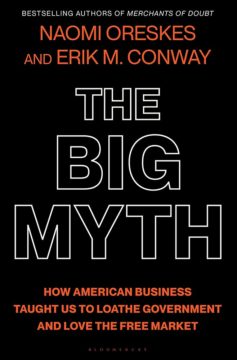 Claudia Dreifus in The Nation:
Claudia Dreifus in The Nation:
The publication of Naomi Oreskes and Erik M. Conway’s Merchants of Doubt: How a Handful of Scientists Obscured the Truth on Issues From Tobacco Smoke to Climate Change in 2010 helped transform how science news was reported in the media. The book persuaded reporters worldwide to become more skeptical of industry-sponsored “experts”—particularly on issues like global warming. Oreskes and Conway hope their latest collaboration, The Big Myth: How American Business Taught Us to Loathe Government and Love the Free Market (Bloomsbury), will have a similar impact. I recently caught up with Oreskes, who teaches science history at Harvard, and is also the author of Why Trust Science, Science on a Mission: How Military Funding Shaped What We Do and Don’t Know About the Ocean, and Plate Tectonics An Insider’s History of the Modern Theory of the Earth. Long ago, in another life, Oreskes was a geologist. During our conversation, we discussed The Big Myth and how free-market economics became a dominant force in American public policy.
—Claudia Dreifus
CLAUDIA DREIFUS: How did the idea behind The Big Myth come to you?
NAOMI ORESKES: After the success of Merchants of Doubt, Erik and I started thinking about doing another book together. At first, we thought we’d write about the technological solutions to climate change. But every time we started, what kept coming up was that a lack of the right technologies wasn’t the problem—most of the technologies we need already exist. But to get them in place, you need the right policies. That’s mostly a political question. That threw us back to something we’d been thinking about since we began researching Merchants of Doubt. In that book, the big question was “Why would intelligent people deny science?” In particular, why would famous scientists attack science to create doubt about the dangers of smoking, the thinning of the ozone layer, and climate change?
More here.
